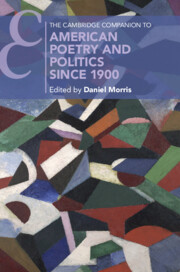Book contents
- The Cambridge Companion to American Poetry and Politics since 1900
- The Cambridge Companion to American Poetry and Politics since 1900
- Copyright page
- Contents
- Notes on Contributors
- Acknowledgments
- Introduction
- Chapter 1 The Space of Public Memory
- Chapter 2 Poetry and Propaganda
- Chapter 3 Depression-Era Poetics and the Politics of How to Read
- Chapter 4 The Politics and Poetics of Revolution
- Chapter 5 Wallace Stevens, Stanley Burnshaw, and the Defense of Poetry in an Age of Economic Determinism
- Chapter 6 The Line of Wit
- Chapter 7 US Poets on War and Peace
- Chapter 8 Institutions of American Poetry
- Chapter 9 African American Political Poetries
- Chapter 10 Our Terribly Excluded Blue
- Chapter 11 Poetry and the Prison Industrial Complex
- Chapter 12 “Oh Say Can You See”
- Chapter 13 The Political Resonances of Hip Hop and Spoken Word
- Chapter 14 Language as Politics in Twentieth- and Twenty-First-Century American Poetry
- Chapter 15 Renovating the Open Field
- Chapter 16 Transcultural Agency
- Chapter 17 Ecopoetry Now
- Chapter 18 The Politics and History of Digital Poetics
- Index
- Cambridge Companions to …
- References
Chapter 12 - “Oh Say Can You See”
Seeing and the Unseen in Citizen: An American Lyric
Published online by Cambridge University Press: 27 April 2023
- The Cambridge Companion to American Poetry and Politics since 1900
- The Cambridge Companion to American Poetry and Politics since 1900
- Copyright page
- Contents
- Notes on Contributors
- Acknowledgments
- Introduction
- Chapter 1 The Space of Public Memory
- Chapter 2 Poetry and Propaganda
- Chapter 3 Depression-Era Poetics and the Politics of How to Read
- Chapter 4 The Politics and Poetics of Revolution
- Chapter 5 Wallace Stevens, Stanley Burnshaw, and the Defense of Poetry in an Age of Economic Determinism
- Chapter 6 The Line of Wit
- Chapter 7 US Poets on War and Peace
- Chapter 8 Institutions of American Poetry
- Chapter 9 African American Political Poetries
- Chapter 10 Our Terribly Excluded Blue
- Chapter 11 Poetry and the Prison Industrial Complex
- Chapter 12 “Oh Say Can You See”
- Chapter 13 The Political Resonances of Hip Hop and Spoken Word
- Chapter 14 Language as Politics in Twentieth- and Twenty-First-Century American Poetry
- Chapter 15 Renovating the Open Field
- Chapter 16 Transcultural Agency
- Chapter 17 Ecopoetry Now
- Chapter 18 The Politics and History of Digital Poetics
- Index
- Cambridge Companions to …
- References
Summary
Claudia Rankine’s fifth book, Citizen: An American Lyric (2014), a volume of poetry and also a New York Times bestseller in the nonfiction category, represents her evolving use of form from lyric toward multiple genres and media. Her first book, Nothing in Nature Is Private (1992), utilizes the individual, lyric poem; thereafter, The End of the Alphabet (1998) expands into lyric sequences. PLOT (2001) employs multiple genres, including fragment, lyric, dialogue, prose, and boxes of text. The first of her “American Lyric” pairing, Don’t Let Me Be Lonely: An American Lyric (2004), is also the first volume to include a wide variety of visual images, employing parataxis as a mode to activate meaning in the “gaps” between individual elements. While her previous books explore individual identities within the context of the social, with Citizen, Rankine sought to more explicitly take poetry into public conversations, shaping discussion of racial inequality. Indeed, Citizen has held a spot on the public stage since its release.
- Type
- Chapter
- Information
- Publisher: Cambridge University PressPrint publication year: 2023

